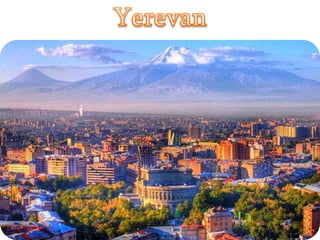Yerevan Artavazd
- 2. “By the greatness of God Khaldi, Argishti, son of Menua, built this mighty stronghold in 782 BC and proclaimed it Erebuni for the glory of Biainili [Urartu] and to the fear of its enemies. Argishti says, “The land was a desert, before the great works I accomplished upon it. By the greatness of Khaldi, Argishti, son of Menua, is a mighty king, king of Biainili, and ruler of Tushpa.”
- 3. The cuneiform inscription found at the site of Arin- Berd on a bazalt flagstone –in the former Erebuni Fortress evidences that Yerevan is one of the oldest cities in the world. It was founded 29 years earlier than Rome. This cuneiform inscription indicates that the Urartian military fortress of Erebuni was founded in 782 BC by the orders of King Argishti I in the the site of current-day Yerevan, to serve as a fort and citadel guarding against the attacks from the north Caucasian tribes Skythians and Alans.
- 4. The first settlement appeared around Erebuni in the seventh AD and was called Yerevan. In one of old documents «Girq Grqots» the city’s name was first mentioned as Yerevan. According to one theory the name Yeravan derives from the king’s name Yervand the 4-th, the founder of the city Yervandashat. Another theory says that the name Yerevan was originated from the name Erebuni. Erebuni means victory. The stronghold was a military construction built to protect northern extreme of Ararat Plain. But it was destroyed by Seljuk Turks in the 11th century. Now only the ruins have remained.
- 5. proclaimed the first Armenian Democratic Republic. , However, the city expanded rapidly during the 20th century as Armenia became one of the fifteen republics in the Soviet Union. At the start of the 20th century, Yerevan was a small town with a population of 30,000. In fifty years, Yerevan was transformed and became Armenia’s principal cultural, artistic, and industrial center, as well as the seat of national government. In 1991 with the independence of Armenia, Yerevan continued with its status as the political and cultural center of the country, being home to all the national institutions: the Government house, the Parliament, ministries, the presidential palace, the constitutional court, judicial court and other public organizations.
- 6. Today’s Yerevan is a big and beautiful city, and has population of more than one million. It is situated in the North –Eastern part of the Ararat Valley. The upland Yerevan is fringed by mountains on three sides. The city is divided into two by the Hrazdan River. The central part of the city involves three main squares: Republic Square, Sakharov Square and Theatrical Square. Republic Square is framed with the buildings of the governmental and administrative ones, the Hotel Armenia the History Museum and the Art Gallery are also to be found in Rpublic Square. Theatrical Square is adjacent to the State Opera and Ballet House.
- 7. One of favorites places in Yerevan is English park. It is a wonderful park and well decorated. There are a lot of trees, many benches. I like this park though it is crowded. I like to walk in this park and to think.


![“By the greatness of God Khaldi, Argishti, son of Menua, built this mighty stronghold in 782 BC and
proclaimed it Erebuni for the glory of Biainili [Urartu] and to the fear of its enemies. Argishti says, “The
land was a desert, before the great works I accomplished upon it. By the greatness of Khaldi, Argishti, son
of Menua, is a mighty king, king of Biainili, and ruler of Tushpa.”](https://image.slidesharecdn.com/yerevan-artavazd-130310085750-phpapp02/85/Yerevan-Artavazd-2-320.jpg)




